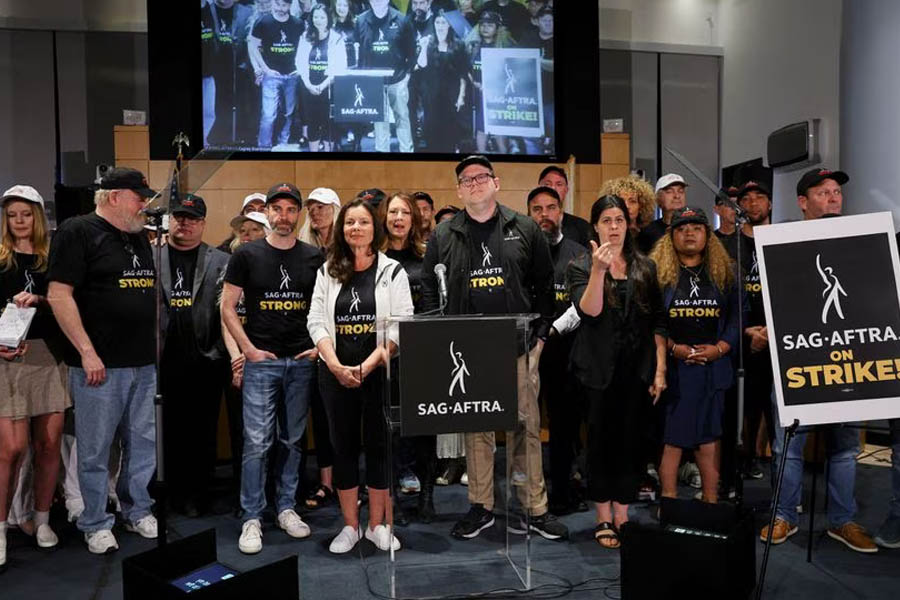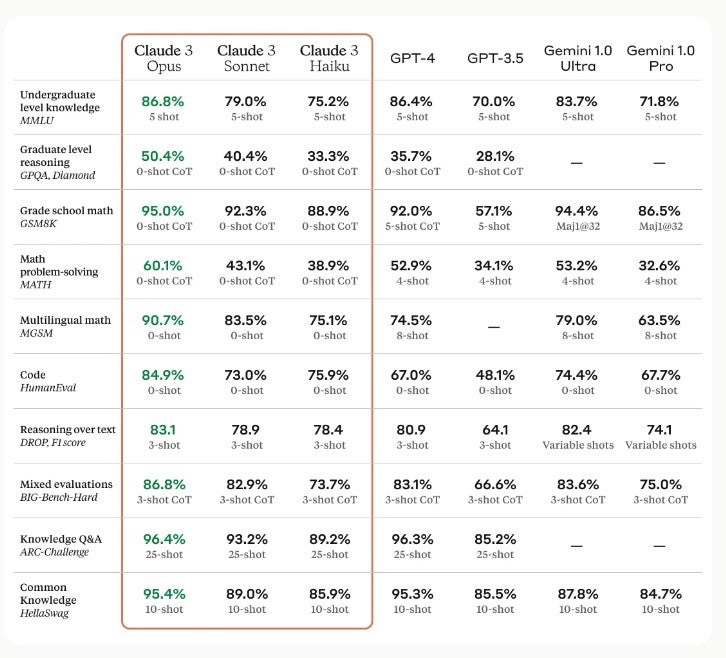Actors And Writers Strike: Hollywood Faces Unprecedented Production Shutdown

Table of Contents
The Demands of the Striking Unions
The strikes are fueled by a multitude of grievances stemming from the changing dynamics of the entertainment industry, particularly the rise of streaming services. Both the WGA and SAG-AFTRA are fighting for better compensation, improved working conditions, and safeguards against the increasing use of artificial intelligence (AI).
Writers Guild of America (WGA) Demands
The WGA's demands center on addressing the evolving landscape of television and film production, particularly concerning fair compensation in the streaming era.
-
Fair Wages and Residuals in the Streaming Era: Traditional television models provided writers with residuals based on syndication and rerun rights. Streaming services have largely disrupted this system, leaving many writers with significantly reduced compensation despite the immense success of their shows. The WGA is fighting to establish a fair and equitable system of residuals that reflects the profitability of streaming platforms.
-
Increased Minimum Staffing on Productions: The increasing pressure to produce content quickly and cheaply has led to reduced writing staffs on many productions. This results in overworked writers facing unsustainable workloads and burnout. The WGA demands increased minimum staffing levels to ensure writers have the time and resources needed to create quality work.
-
Regulations Concerning the Use of AI in Writing and Script Generation: The rapid advancement of AI writing tools poses a significant threat to writers' livelihoods. The WGA is demanding regulations to prevent the use of AI to replace human writers and to protect their intellectual property.
-
Key WGA Demands Summary:
- Guaranteed minimum staffing levels on productions.
- Fair and equitable residuals for streaming platforms.
- Regulations and safeguards against the use of AI in writing.
- Improved health insurance and pension plans.
SAG-AFTRA Demands
SAG-AFTRA's strike echoes many of the WGA's concerns, emphasizing the impact of streaming on actors' compensation and the ethical concerns surrounding AI.
-
Fair Wages and Residuals in the Streaming Era: Similar to writers, actors see significantly diminished residuals from streaming platforms compared to traditional television. SAG-AFTRA is pushing for a compensation model that accounts for the immense reach and profitability of streaming content.
-
Protections Against the Use of AI: The use of AI to generate actors' likenesses and performances raises significant ethical and legal concerns. SAG-AFTRA is demanding strong protections to prevent the unauthorized use of actors' images and performances for AI-generated content.
-
Improved Working Conditions on Set: SAG-AFTRA is advocating for better working conditions on set, including reasonable working hours, safer environments, and fair treatment by production companies. Specific examples include addressing issues like long hours, inadequate rest periods, and unsafe working conditions.
-
Key SAG-AFTRA Demands Summary:
- Increased minimum pay and residuals for streaming content.
- Strong protections against the unauthorized use of AI.
- Improvements to working conditions and safety regulations on set.
- Increased transparency in the financial dealings of streaming platforms.
The Impact of the Production Shutdown
The simultaneous strike by the WGA and SAG-AFTRA has brought about an unprecedented production shutdown, resulting in significant financial and creative implications.
Financial Implications
The economic impact of the Hollywood strike is substantial and far-reaching.
-
Loss of Revenue for Studios and Production Companies: The shutdown translates to a massive loss of revenue for studios and production companies, delaying projects and impacting their bottom lines. Estimates put the daily cost of the strike in the tens of millions of dollars.
-
Impact on Related Industries: The ripple effect extends beyond the studios. Numerous related industries, such as catering, transportation, hospitality, and post-production, experience significant job losses and revenue reductions.
-
Delayed Movie and Television Releases: Numerous highly anticipated films and television shows have been delayed indefinitely, impacting release schedules and marketing strategies.
Creative Implications
The strike's consequences extend beyond the purely financial, significantly impacting the creative landscape.
-
Delayed Projects and Potential Creative Stagnation: The shutdown stalls numerous projects, potentially leading to creative stagnation and impacting the flow of new content. The long-term effect on the industry's creative output remains to be seen.
-
Impact on the Pipeline of New Talent: Aspiring actors and writers rely on entry-level jobs and opportunities within the industry. The strike threatens to disrupt the pipeline of new talent, potentially impacting the future of Hollywood.
-
Shifting Power Dynamics within the Industry: The strike has brought the power imbalance between studios and unions into sharp focus. The outcome of the negotiations may lead to significant shifts in the industry's power dynamics and future negotiations.
Potential Resolutions and the Path Forward
The path to resolving the strike involves navigating complex negotiations and addressing deeply entrenched issues within the entertainment industry.
Negotiation Challenges
The negotiations between the unions and the AMPTP (Alliance of Motion Picture and Television Producers) face several significant hurdles.
-
Key Sticking Points in Negotiations: Key points of contention include the level of residuals for streaming services, the use of AI, and the definition of "fair wages" in the current economic climate.
-
The Role of Public Opinion and Media Coverage: Public opinion and media coverage play a significant role in influencing the negotiations. Strong public support for the unions could strengthen their negotiating position.
-
Potential Compromises and Concessions: Reaching a resolution requires compromises from both sides. This could involve finding creative solutions to address the challenges posed by streaming services and AI.
Long-Term Effects on the Industry
The outcome of this strike will likely have lasting effects on the entertainment industry.
-
Potential for Lasting Changes in the Way the Industry Operates: The strike could lead to fundamental changes in how the industry operates, impacting compensation models, working conditions, and the use of AI.
-
The Future of Streaming Services and Their Relationship with Creators: The strike forces a re-evaluation of the relationship between streaming services and the creators who produce their content. New business models and fairer compensation structures may emerge.
-
The Role of Unions in Protecting Workers' Rights in the Evolving Media Landscape: The strike underscores the critical role of unions in advocating for workers' rights in the rapidly evolving media landscape. It highlights the importance of collective bargaining and the power of organized labor.
Conclusion
The actors and writers strike represents a pivotal moment for Hollywood. The unprecedented production shutdown highlights deep-seated issues regarding fair compensation, working conditions, and the impact of new technologies like AI. The outcome of these negotiations will significantly shape the future of the entertainment industry. The financial and creative implications are profound, extending beyond the immediate participants to touch countless individuals and businesses across various related industries. The long-term consequences will undoubtedly reshape the landscape of film and television production.
Call to Action: Stay informed about the developments in the ongoing actors and writers strike and support the efforts of the unions to achieve a fair and equitable agreement. Understanding the issues at stake is crucial for the future of creative content. Follow the progress of the Hollywood strike to see how these critical negotiations impact the industry. Keep up to date on the SAG-AFTRA strike and the WGA strike to understand the implications of this unprecedented shutdown. The future of Hollywood depends on it.

Featured Posts
-
 Jalkapallo Jacob Friisin Avauskokoonpanossa Kamara Ja Pukki Vaihdossa
May 20, 2025
Jalkapallo Jacob Friisin Avauskokoonpanossa Kamara Ja Pukki Vaihdossa
May 20, 2025 -
 The Tony Hinchcliffe Wwe Segment A Disappointment
May 20, 2025
The Tony Hinchcliffe Wwe Segment A Disappointment
May 20, 2025 -
 New Music Monday Playlist 2 24 25 Lightning 100
May 20, 2025
New Music Monday Playlist 2 24 25 Lightning 100
May 20, 2025 -
 Chat Gpt Plus Gets A Coding Upgrade Introducing The Ai Coding Agent
May 20, 2025
Chat Gpt Plus Gets A Coding Upgrade Introducing The Ai Coding Agent
May 20, 2025 -
 Sandylands U Your Complete Tv Guide
May 20, 2025
Sandylands U Your Complete Tv Guide
May 20, 2025
